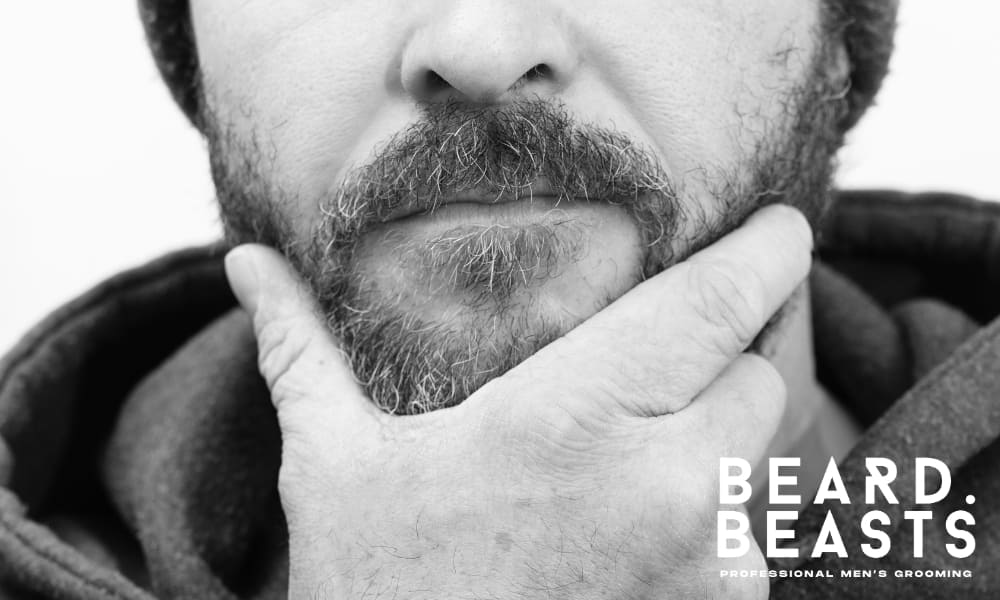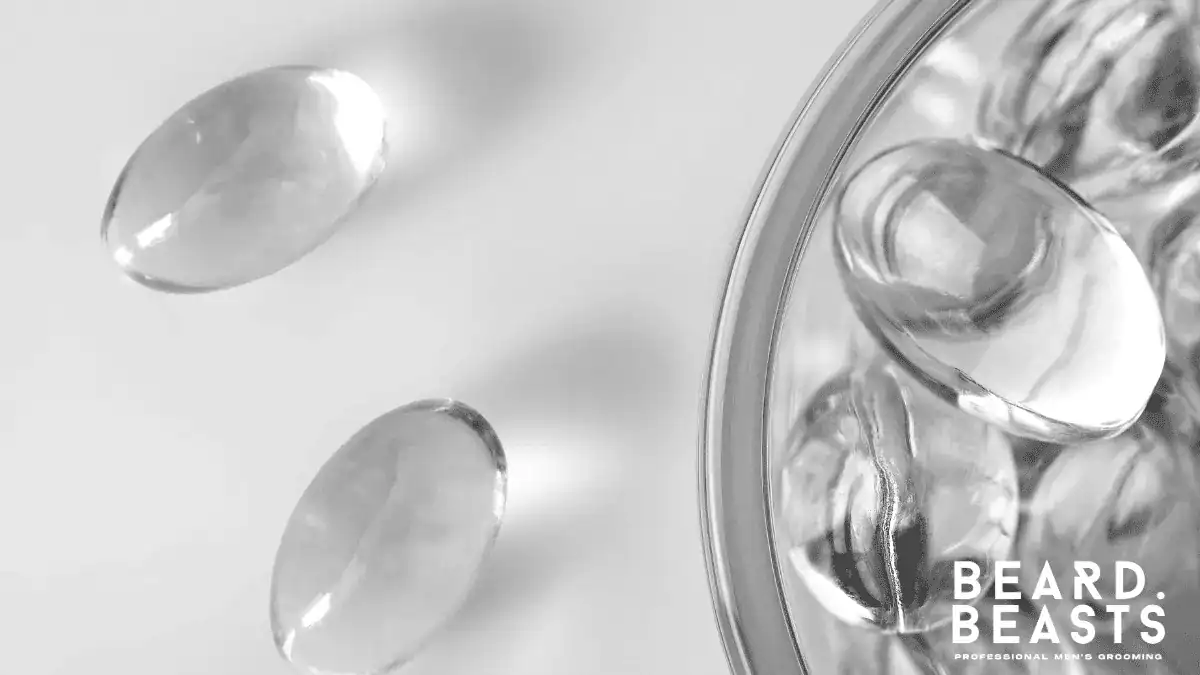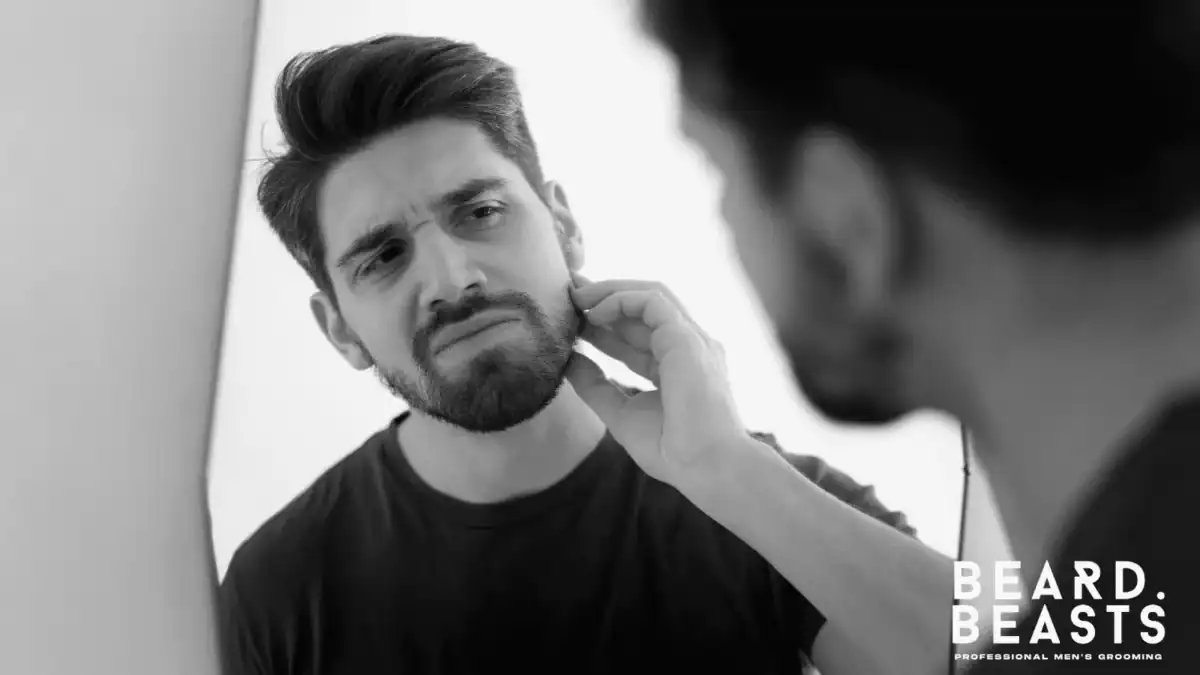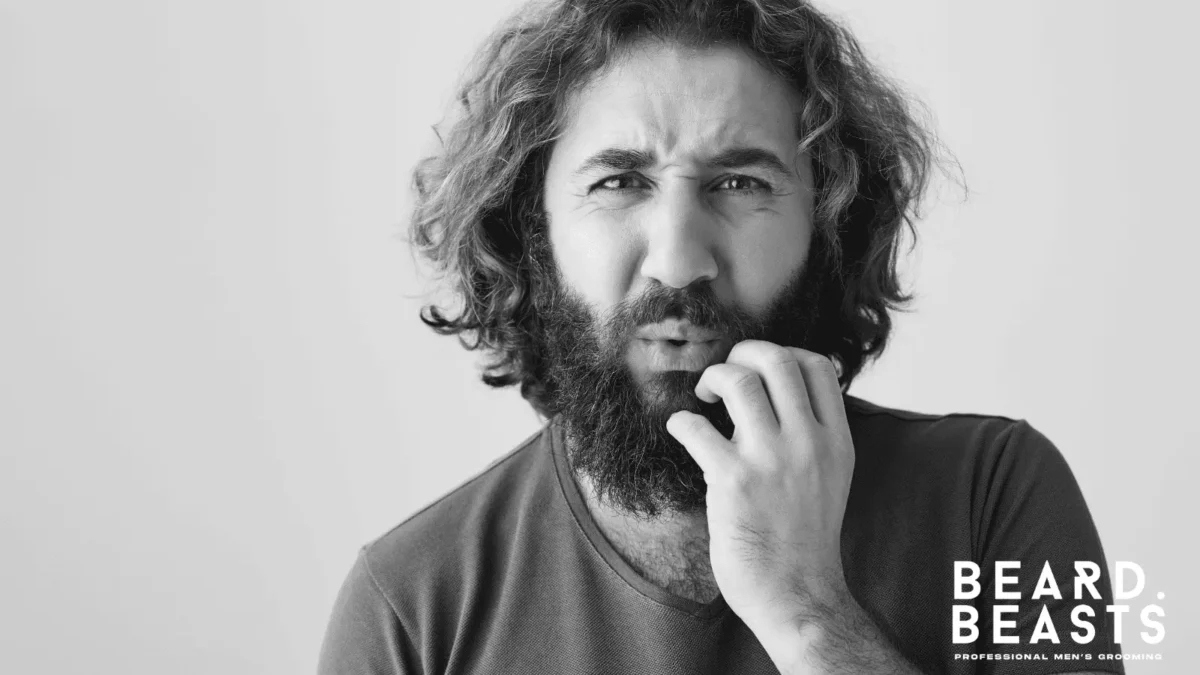Ever wondered, ‘Why does my beard hurt?’ You’re not alone. Many guys with beards experience discomfort at some point. It might be that annoying itch when you first start growing it out, or maybe a soreness that just won’t go away. Figuring out what’s causing that pain is the first step to feeling better.
This article breaks down the common reasons beards can hurt, like ingrown hairs, dry skin, and even simple grooming mistakes. We’ll show you easy ways to fix these problems and prevent them from happening again, so your beard is something you enjoy, not something that bothers you. Let’s get started!
Why Does My Beard Hurt? Common Reasons
Okay, so you’re dealing with beard pain. What’s causing it? Turns out, there are several common culprits, from how you groom your beard to underlying skin conditions. Let’s break those down.
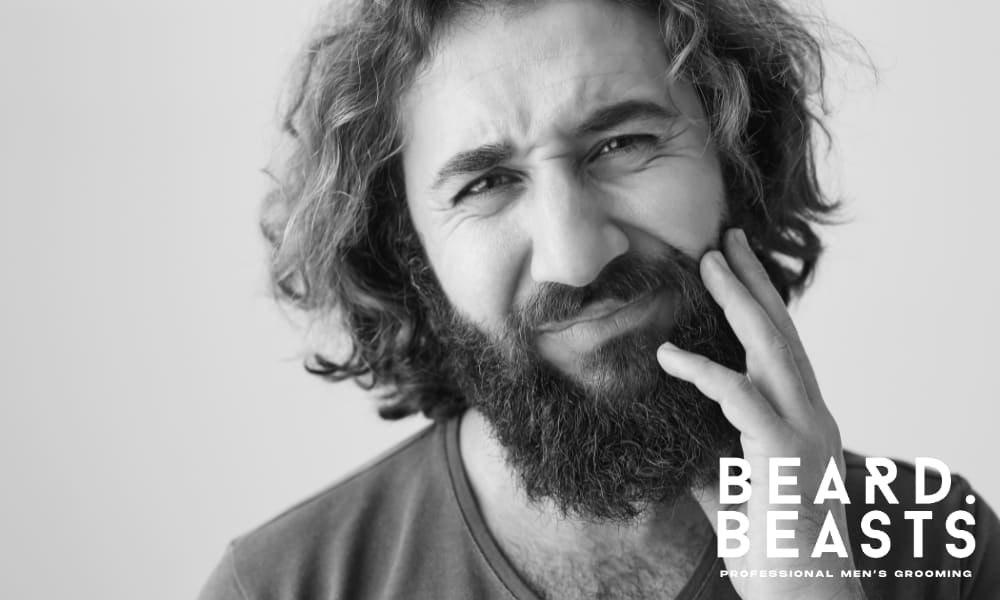
Ingrown Hairs
Ingrown beard hairs are a common problem. Think of it like this: your beard hair curls back and pokes into your skin, causing a painful, red bump. This often happens when you shave against the grain or if you have naturally curly beard hair. If you notice increased swelling, pus, or severe pain, it might be infected, and you should consider at-home care, or seeing a doctor.
Dry Skin
Dry, flaky skin under your beard is another common issue. Cold winter air, harsh sun, and even hot showers can strip your skin of its natural oils, leading to itchiness and soreness. Some skincare products with strong fragrances or alcohol can also dry out your skin. Look for beard oils with ingredients like jojoba oil or argan oil, which help to keep your skin hydrated.
Grooming Mistakes
How you take care of your beard really matters. Using harsh soaps or alcohol-based products can irritate your skin and hair follicles. Also, being too rough when brushing or trimming can pull on your hair and cause discomfort. Gentle grooming with the right tools and products is key to avoiding these problems.
Skin Conditions
Sometimes, the pain might be from underlying skin conditions like folliculitis (inflammation of hair follicles), seborrheic dermatitis (a type of eczema that causes flaky, white to yellowish scales to form on oily areas), or psoriasis (a skin disease that causes red, itchy, scaly patches).
These can hide under your beard and cause itching, pain, and redness. If you suspect you have one of these conditions, it’s best to see a dermatologist for proper diagnosis and treatment.
Beard Acne
Yes, you can get acne in your beard! When sweat, oil, and dead skin cells clog your pores, you get pimples. This not only hurts but can also affect how your beard looks. Using non-comedogenic products (those that don’t clog pores) and keeping your beard clean can help prevent beard acne.
Knowing why your beard hurts is the first step to fixing it. Whether it’s dealing with ingrown hairs, dry skin, or acne, a little extra care can make a big difference. A good grooming routine and taking care of your skin will keep your beard healthy and pain-free.
How to Diagnose Beard Pain

Understanding why your beard hurts is the first step to beard pain relief. Let’s break down how to diagnose the causes and get you feeling better.
What to Look For
When trying to figure out why your beard hurts, look for these common symptoms:
- Redness and Irritation: If you see red or irritated skin under your beard, it could mean inflammation or an allergic reaction to a product you’re using.
- Itchy, Flaky Skin: Constant itching with flakes usually points to dry skin beard issues or dandruff.
- Painful Bumps: Those sore, red bumps? They’re often signs of an ingrown beard hair problem or beard acne.
- Soreness and Sensitivity: If your beard feels tender to the touch, it might be from grooming mistakes or one of several beard skin conditions.
These signs are your clues, but knowing what they mean is key to fixing the problem and getting beard pain relief.
When to See a Dermatologist
While many beard issues can be managed at home, it’s important to know when to seek professional help. If you experience persistent pain that doesn’t improve with home remedies, signs of infection like increased redness, swelling, or pus, or any sudden changes to your beard or skin, consult a dermatologist.
They can provide a proper diagnosis and create a tailored treatment plan. Don’t hesitate to seek professional advice when needed for effective beard pain relief and to ensure the health of your skin.
By paying close attention to these signs and knowing when to seek professional help, you can take control of your beard health and find lasting relief. Remember, addressing beard pain promptly will lead to a more comfortable and enjoyable beard growing experience.
How to Fix Common Beard Pain Issues
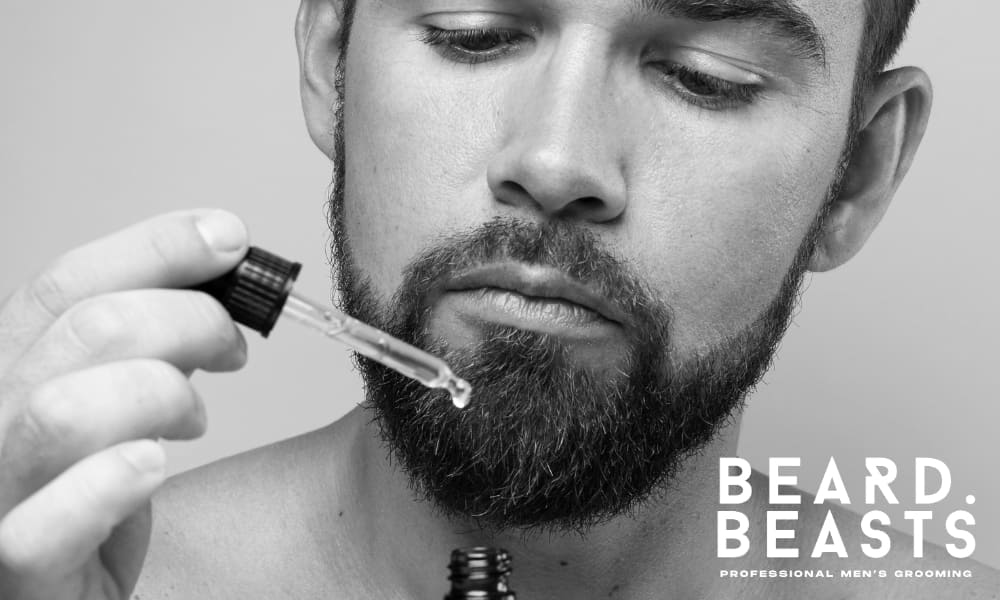
Tired of thinking, ‘why does my beard hurt?’ Let’s get down to fixing those common beard pain issues. Growing a beard should be a source of pride, not discomfort. Here’s how you can tackle each problem and get back to enjoying your beard.
Ingrown Beard Hairs
- Gentle Exfoliation: Use a mild exfoliating scrub or a soft-bristled brush a few times a week to get rid of dead skin cells. This helps stop hairs from getting trapped under the skin, which is a major cause of ingrown beard hairs.
- Smart Shaving: If you shave, always go with the grain of your hair. Use a sharp, clean razor to avoid irritation. And don’t stretch your skin while shaving; that can lead to hairs being cut too short and becoming ingrown.
Dry Skin Under Your Beard
- Regular Moisturizing: After washing your beard, use a good beard oil to keep your skin and hair hydrated. Look for natural ingredients like coconut oil, argan oil, or jojoba oil.
- Stay Hydrated: Drink plenty of water. Aim for at least 8 glasses a day. This helps keep your skin’s moisture balance right, reducing dryness and irritation.
Grooming Mistakes
- Use the Right Tools: Get a quality beard comb and beard scissors for trimming. This stops split ends and tangles, which can pull on your skin. Stay away from electric razors for close shaves; they can be rough on your skin.
- Be Gentle: After washing, pat your beard dry with a soft towel instead of rubbing. This prevents irritation and keeps your skin and beard hair in good shape.
Beard Skin Conditions
- See a Dermatologist: If you think a skin condition is causing your beard pain, see a dermatologist. They can figure out what’s going on and give you the right treatment.
- Follow Your Skincare Routine: Use medicated shampoos or creams as your doctor says. For conditions like seborrheic dermatitis, products with ketoconazole, selenium sulfide, or zinc pyrithione can help.
Beard Acne
- Keep It Clean: Wash your beard daily with a gentle cleanser to get rid of oil and dead skin cells that clog pores. Don’t over-wash, though, or you’ll dry out your skin.
- Use Non-Comedogenic Products: Pick beard care products that won’t clog your pores.
By dealing with the specific cause of your beard pain, whether it’s ingrown beard hairs, dry skin, grooming mistakes, skin conditions, or beard acne, you’ll feel a lot better. A little care and the right products go a long way in keeping your beard healthy and pain-free.
Recommended Products for Soothing Beard Pain
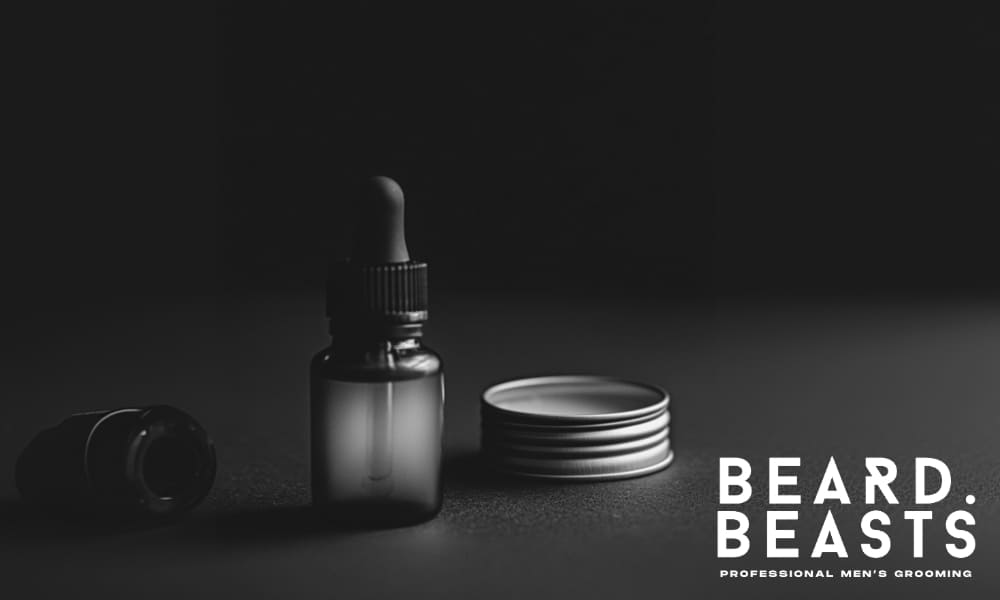
After understanding the causes of beard pain and how to diagnose them, the next step is building a routine that promotes comfort and health. The right products are essential tools in this process. Think of them as your daily allies against irritation and discomfort.
Nourishing Beard Oils for Daily Hydration
Beard oils are foundational for addressing dry skin and irritation. Look for oils rich in:
- Jojoba Oil: Its close resemblance to your skin’s natural oils allows for deep, non-greasy hydration.
- Argan Oil: Packed with antioxidants and fatty acids, it strengthens hair and softens skin.
- A blend of these, or similar, natural oils will keep your beard hydrated and supple, reducing itchiness and discomfort throughout the day.
Protective Beard Butters for Lasting Comfort
Beard butters provide a crucial barrier against environmental stressors and lock in moisture. When choosing a butter, prioritize ingredients like:
- Shea Butter: Its emollient properties soothe irritated skin and soften coarse hair.
- Beeswax: This creates a protective seal, preventing moisture loss and shielding your beard from wind and cold.
- A well-formulated beard butter will add a layer of protection, keeping your beard comfortable even in harsh conditions.
Essential Cleansing and Grooming Tools
Beyond oils and butters, these products are vital for maintaining beard health:
- Gentle Beard Wash: A specialized beard wash will cleanse without stripping essential oils, preventing dryness and irritation.
- Quality Beard Brush: A brush with natural bristles will distribute products evenly and gently exfoliate the skin beneath, promoting healthy growth and preventing ingrown hairs.
Integrating these products into your daily routine is more than just a matter of grooming; it’s an investment in your comfort and well-being. By choosing products with nourishing ingredients and using them consistently, you’ll create a foundation for a healthy, irritation-free beard.
How To Prevent Beard Pain Going Forward
Now that you’ve established a solid product routine, let’s focus on long-term prevention. Keeping beard pain at bay isn’t just about addressing issues as they arise; it’s about creating habits that support ongoing comfort and health.
Consistent Daily Care: The Foundation of Comfort
- Daily Hydration: Continue to use your beard oil daily. Consistent hydration is key to preventing dry skin and irritation. Apply it after washing your face or showering, when your pores are open and receptive.
- Regular Conditioning: Use your beard butter as needed, especially in harsh weather conditions or after activities that might dry out your beard. This creates a protective barrier and locks in moisture.
- Gentle Cleansing: Stick to your gentle beard wash, using it 2-3 times a week. Avoid harsh soaps or shampoos that can strip natural oils.
- Daily Grooming: Use your quality beard brush daily. Gentle brushing distributes oils, exfoliates the skin, and prevents tangles that can lead to irritation.
Lifestyle Habits for Beard Health
- Hydration from Within: Drink plenty of water throughout the day. Internal hydration complements topical care and keeps your skin supple.
- Balanced Diet: A diet rich in vitamins and minerals supports healthy hair growth and skin health. Focus on foods high in Omega-3 fatty acids, vitamins A, C, and E, and biotin.
- Minimize Irritants: Be mindful of environmental irritants. Protect your beard from extreme weather conditions with scarves or balms. Avoid harsh chemicals in cleaning products or laundry detergents that come into contact with your beard.
- Stress Management: Stress can manifest in skin issues. Incorporate stress-reducing activities into your routine, such as exercise, meditation, or hobbies.
Proactive Skin Awareness
- Regular Self-Checks: Pay attention to any changes in your beard or skin. Early detection of potential problems can prevent them from escalating.
- Product Awareness: Stay informed about the ingredients in your beard care products. Choose natural and gentle formulations, and avoid known allergens.
- Listen to Your Skin: If a product causes irritation, discontinue use immediately. Your skin’s response is a valuable indicator of what works and what doesn’t.
By integrating these preventative measures into your daily life, you’ll not only avoid beard pain but also cultivate a healthy and vibrant beard. Remember, consistent care and proactive habits are the keys to long-term comfort and confidence.
Frequently Asked Questions About Why Does My Beard Hurt?
If you’re still wondering, ‘Why does my beard hurt?’ you’re not alone. Beard pain can be a real puzzle, and it’s definitely something many guys deal with. Here are some of the most common questions about beard discomfort, along with straightforward answers to help you find relief.
Why do my beard hairs hurt?
Your beard hairs might hurt for a few reasons: ingrown hairs, dry skin, rough grooming, or even just tight facial expressions. Keeping your beard moisturized and groomed properly can make a big difference.
How can I make my beard less painful?
Start with a gentle washing routine, use beard oil or butter regularly, and detangle with a soft brush. Also, make sure your trimming technique isn’t pulling or snagging hairs.
Why does it hurt to trim my beard?
If trimming hurts, your tools might be dull, you could be cutting too close, or your beard might be tangled. Sharp, clean tools and combing before trimming are key. Trimming after a shower, when your hair is softer, can also help.
Why does my beard hurt at night?
Nighttime pain could be from pressure on your beard while you sleep, or from dry skin getting more irritated. A silk pillowcase can reduce friction, and a light beard oil before bed can help with dryness.
Why does my chin hurt when I have a beard?
Chin pain can come from tension in your beard hair, skin conditions like folliculitis or dermatitis, or chafing against clothing. Regular care and targeted treatments for skin conditions can help.
Why do my mustache hairs hurt?
Just like beard hairs, mustache hairs can hurt from dryness, ingrown hairs, or improper grooming. Moisturizing and gentle combing are essential, and make sure you’re trimming properly to avoid ingrown hairs.
Understanding the causes of beard pain and how to address them can transform your grooming routine into something enjoyable. A little care goes a long way in keeping your beard and mustache comfortable.
By following these tips, you can say goodbye to beard pain and enjoy growing and maintaining your facial hair.
Final Thoughts On Why Does My Beard Hurt?
The question ‘why does my beard hurt?’ doesn’t have to be a constant concern. By understanding the common causes and applying the solutions we’ve explored, you’re taking significant steps toward a more comfortable beard. Remember, consistent care is key. Addressing issues like dryness or irritation isn’t just about immediate relief; it’s about building a healthy foundation for your beard’s long-term well-being.
Ultimately, a pain-free beard contributes to overall confidence. By paying attention to your beard’s needs and adopting a proactive approach, you’ll transform your grooming routine into a source of satisfaction. Listen to your skin, adapt your care, and take pride in the healthy, comfortable beard you achieve. Your beard, after all, is a reflection of your commitment to self-care.

